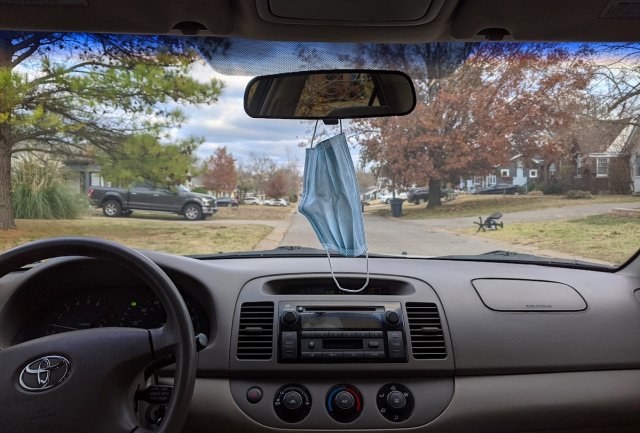
Here is a heartwarming holiday story.
I have been planning for a while to visit my parents in Colorado this week, both for Thanksgiving and for my mother’s birthday. Accordingly, I’ve been keeping myself to myself in preparation for the trip.
I’ll admit it wasn’t a total quarantine. On Friday, Nov. 6, I had drinks on an open-air, spaced-out patio. But that was just more than fourteen days before I planned to leave, and since then my contact with the outside world had been minimal. In the two weeks before my departure, I picked up take-out, pumped gas and made a couple of quick trips to the grocery store. But I always wore a mask and always washed my hands immediately afterward. Otherwise, I wasn’t around anyone, and I certainly didn’t do anything you’d call high-risk. You might even call me “responsible.”
Early Saturday morning, I got in my car and set out for Colorado. (Obviously I was driving, not flying — again, responsible). I’d tried a few times to get a test before leaving, but I had given up after spending a total of about three hours on hold. But I’d been cautious enough to feel confident that I wasn’t being negligent.
After a couple of hours on I-35, I noticed that the very slightly scratchy throat I’d woken up with wasn’t going away. In fact, it maybe felt like I was possibly getting sick?
I pulled into a rest area in Kansas and started to look for a place nearby to get a test — just to be extra safe, extra responsible. An urgent-care clinic in a nearby town seemed promising, but when I got there I was greeted by a sign saying the clinic was closed because of a staffing shortage. I looked up a few other places, only to find they were closed for the weekend, or that I’d need a doctor’s referral, or that the turnaround time on their tests was at least a week.
I got back on the highway, feeling sure I was just being paranoid anyway. I’d get a test when I got to Colorado and wear a mask and keep a distance from my parents until it came back clear.
But as I was driving through Wichita, nightmare scenarios began playing out in my head. I imagined how stupid and guilty I’d feel for landing one of my parents in the hospital because I had ignored a mild sore throat.
I got myself so worked up that I finally did the thing that, until that minute, had not really occurred to me as an option: I turned around and drove home.
You’ve probably already guessed where this story ends up: I got a COVID-19 test on Saturday afternoon, and on Sunday morning it came back positive. So now I won’t be going anywhere for Thanksgiving or for a while after.
The limits of personal responsibility
Here in Oklahoma, the message we keep hearing from Gov. Kevin Stitt and others is all about personal responsibility. We are told that all of us need to take it upon ourselves to wear a mask and wash our hands and keep distance from others. This is purportedly the key to controlling the spread of COVID-19.
So what are we to make of a story like mine, of someone being responsible but getting the virus anyway?
The wrong lesson to take from all this would be the nihilistic one: that there’s nothing to be done and so we might as well not do anything.
Instead, maybe the moral of the story is that while personal responsibility is important, it sometimes isn’t enough. Personal responsibility can’t help you when others choose to be irresponsible. It can’t make it easier to access testing or health care. It can’t bypass faulty technology or missing public-health infrastructure.
In fact, as I just learned, sometimes you can’t even know if you’re being responsible or not. A quick, masked restroom stop in Kansas felt very cautious and responsible on Saturday, even if I wondered whether I could catch COVID from the maskless travelers loitering in the gift shop. Knowing now that I was the disease vector in that situation makes the stop seem almost reckless.
There are limits to how much individual responsibility can accomplish in combating COVID-19 because the pandemic isn’t an individual problem. It’s a population-level problem that needs population-level solutions. But those require a significant investment of both resources and political will.
There’s obviously the much-debated issue of mask mandates and school and business closures. But even putting those aside for a second, it’s clear that there are many ways we’ve failed to have a robust response to this outbreak, either because of fumbled decision-making or because of pre-existing flaws in our medical and public health systems.
For instance, wouldn’t it be nice if getting a COVID test were not such a rigamarole? It’s confusing and exhausting to navigate the appointment requirements, wait times, accuracy rates, cost and turnaround times for each different provider in our atomized health care system. Ideally, there would be widespread, free public tests and an easy app to look up where to get them. But as I was sitting in my car Googling COVID testing in Kansas, it occurred to me that at the very least we ought to have all the information you need to get a test in a centralized place by now, rather than spread across clunky state and county websites and several layers deep in various hospitals’ call-waiting systems.
Or, as another example, when I got my positive test result on Sunday morning, that was the only information I received. So far, it has not come with any instructions for quarantining or information on how long I’ll be contagious. I’m relying on my own online research to find that information and to sort out the needed facts from the many inaccurate or outdated rumors that are always flying around. (According to the latest CDC guidelines, my isolation can end 10 days after the onset of my mild symptoms, as long as I have not had a fever for at least 24 hours.)
Pulling up in front of the darkened windows of that urgent-care clinic also made me marvel at the scale of systemic failure that causes a medical facility to shut down in the midst of the greatest health crisis in a century.
Responsibility isn’t just something that falls on individual citizens, who can control only their own actions. There is an even greater responsibility that falls on those who are positioned to make decisions that fall outside the control of individuals and affect all of society.
A word to the cautious
This is not to say that one person’s actions are unimportant. I’m sure some people will read this and take issue with me calling myself responsible, saying I shouldn’t have considered making the trip to Colorado in the first place.
With 20/20 hindsight, I have to confess those people might be right. If I’d been asymptomatic, or if my symptoms had started just one day later, I would have blithely wafted the coronavirus across the plains and into my parents’ house.
Life has to go on, even during the pandemic, and we are all constantly making calculations about how to balance risk, responsibility and maintaining some baseline of mental health.
But the humbling lesson I’ve learned in the past few days and during my five-hour drive to nowhere is that even those of us who consider ourselves careful about COVID shouldn’t rest on the laurels of our own responsibleness. Which means that when public-health experts issue very pointed guidance, such as begging people not to travel for Thanksgiving, the responsible thing to do is not to assume that our caution exempts us.
Acting as though every directive applies to us — yes, us — is both the least we can do and just about the only thing we can do.





















